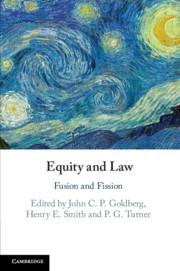Book contents
- Equity and Law
- Equity and Law
- Copyright page
- Contents
- Figures
- Table
- Contributors
- Acknowledgements
- Abbreviations
- Table of Cases
- Statutes
- 1 Fusion and Theories of Equity in Common Law Systems
- Part I Legal Systems and Legal Institutions
- Part II Fusion and Fission in Doctrine and Practice
- 9 Equity and the Common Counts
- 10 Mistake and Unfairness in Contract Law
- 11 Lex Sequitur Equitatem
- 12 Rediscovering the Equitable Origins of Discovery
- Part III Functional, Analytical and Theoretical Views
- Index
10 - Mistake and Unfairness in Contract Law
from Part II - Fusion and Fission in Doctrine and Practice
Published online by Cambridge University Press: 26 July 2019
- Equity and Law
- Equity and Law
- Copyright page
- Contents
- Figures
- Table
- Contributors
- Acknowledgements
- Abbreviations
- Table of Cases
- Statutes
- 1 Fusion and Theories of Equity in Common Law Systems
- Part I Legal Systems and Legal Institutions
- Part II Fusion and Fission in Doctrine and Practice
- 9 Equity and the Common Counts
- 10 Mistake and Unfairness in Contract Law
- 11 Lex Sequitur Equitatem
- 12 Rediscovering the Equitable Origins of Discovery
- Part III Functional, Analytical and Theoretical Views
- Index
Summary
It is often said, invoking the seventeenth-century Chancellor Lord Nottingham, that the Chancery – or modern courts of equitable jurisdiction – ‘mends no man’s bargain’. This chapter suggests that a legal system which holds that opinion is unwise to do so, that modern courts are not constrained to share that opinion, and that Lord Nottingham himself did not hold it. In various cases, Nottingham granted relief which modified a contractual bargain, or showed himself willing to do so. The power of courts to do so continued to be recognised into the nineteenth century, when it came under fire from the dogma that freedom of contract is sacrosanct. However, modern cases show that the legal system must also advance other values. The necessity to avoid unjust windfalls is an example. The courts can do so, and should be willing to modify contracts in limited situations, without necessarily relying on the language of equity.
- Type
- Chapter
- Information
- Equity and LawFusion and Fission, pp. 229 - 253Publisher: Cambridge University PressPrint publication year: 2019

